
The PROUT PERFORMER lists 2021 are online!
The nomination process already started at the beginning of the year and now the time has finally come! You can now get a glimpse of this year’s PROUT PERFORMER lists and be inspired by impressive individuals and their stories.

The German Diversity Day takes place every year and is a initiative of Charta der Vielfalt e.V.. Companies and organizations across Germany participate with a wide range of online and offline activities on diversity – whether for their own employees or the general public. The aim is to bring diversity in all its dimensions into focus in the workplace. This year, the 9th German Diversity Day (#DDT21) will take place on May 18 and all actions will be collected digitally under the hashtag #VielfaltVerbindet. All further information about the day of action can be found on the website of Charta der Vielfalt e.V..
We are in!
We will guide you through our seven HOW TO guides for #DDT21 on our website and social media. The guides highlight social changes from a business perspective. They show options for action that put companies and organizations on the safe side while also taking into account the needs of employees. Gain insights into topics such as “Same-sex marriage” “The third gender option” or learn something about gender-inclusive language with our “Sprechen Sie LGBT*IQ” guide.
HOW TO – our lgbt*iq guides
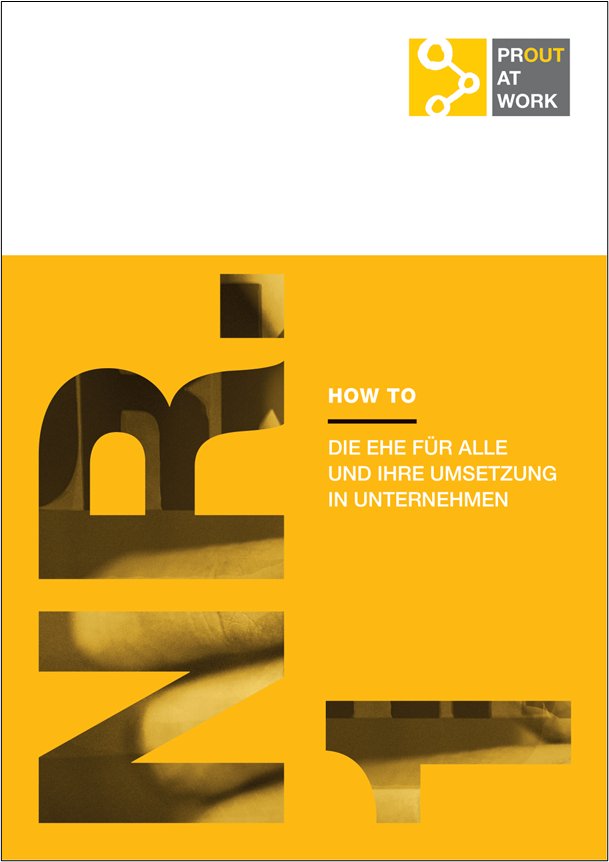
HOW TO NO. 1 | GERMAN
Same-sex Marriage and What it Means for Businesses
Dear businesspeople and other interested parties, we would like to provide you below with a short guide regarding the changes you can expect in everyday business life as a result of marriage equality and how you can respond to them.
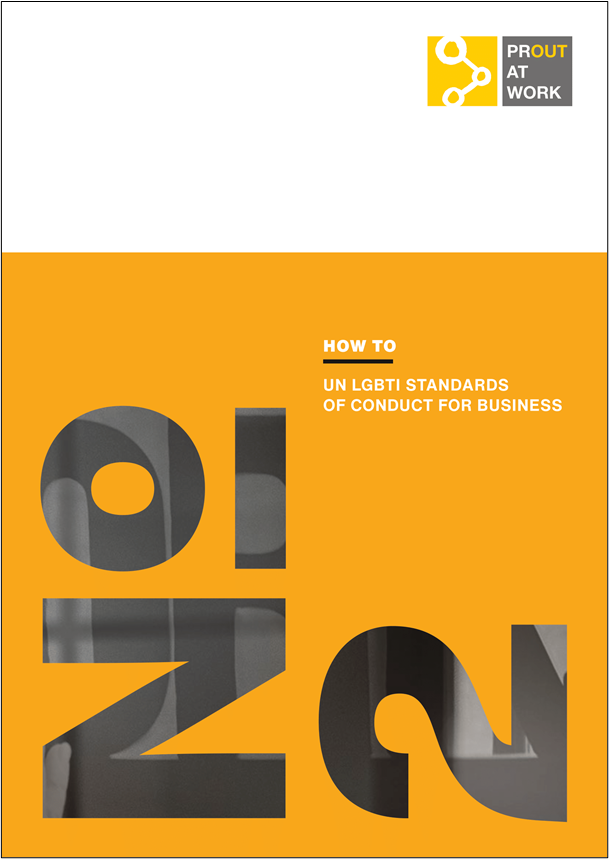
HOW TO NO. 2 | GERMAN & English
UN LGBTI Standards of Conduct for Business
A theoretical overview of the UN LGBTI Standards of Conduct for Business and practical suggestions for implementation in everyday business life.
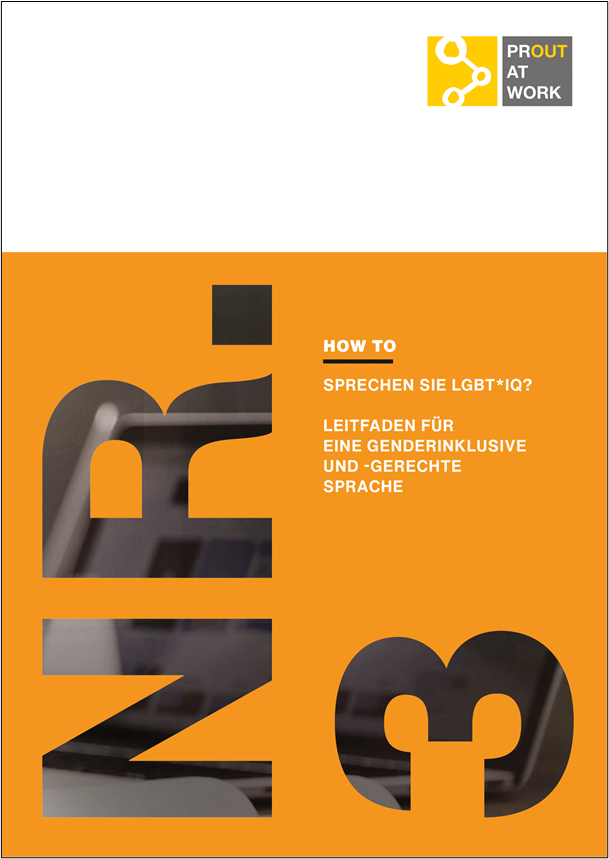
HOW TO NO. 3 | GERMAN
Do You Speak LGBT*IQ?
Language is much more than just a way to express ourselves – it’s also a mirror to our society. It tells us who is truly considered a full member and who is only included as a footnote. If you want to know how everyone can be included linguistically, you will find practical everyday answers and examples in this guide.
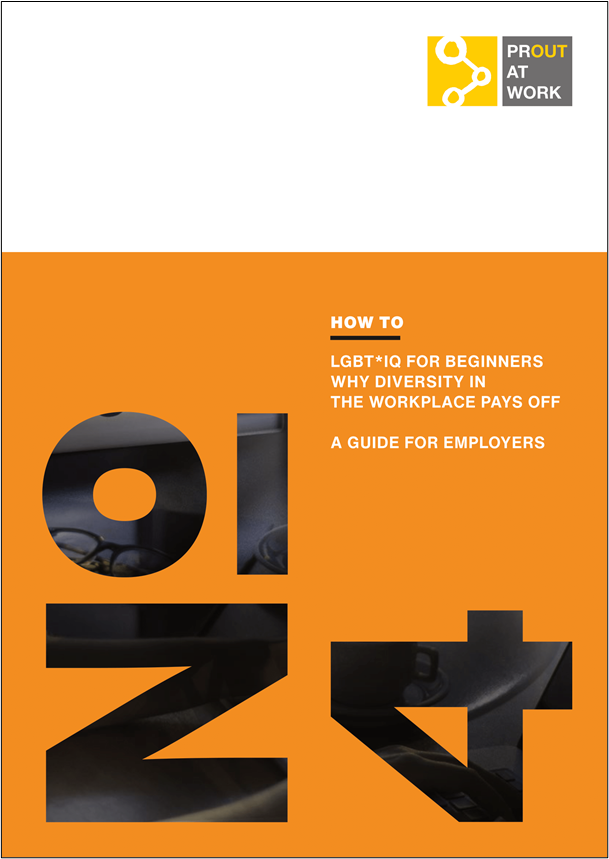
HOW TO No. 4 | GERMAN & ENGLISH
LGBT*IQ FOR BEGINNERS. WHY DIVERSITY IN THE WORKPLACE PAYS OFF. A GUIDE FOR EMPLOYERS.
The perfect piece of reading for all employers who have understood that they will meet LGBT*IQ topics all over their company. A beginner’s guide from A as in acronym (what does LGBT*IQ actually mean?) to Z as in zero disturbances concerning personnel development. It will then be clear why the commitment to equal opportunities in the workplace is financially and culturally worthwhile and how diversity can materialize into minds and structures.
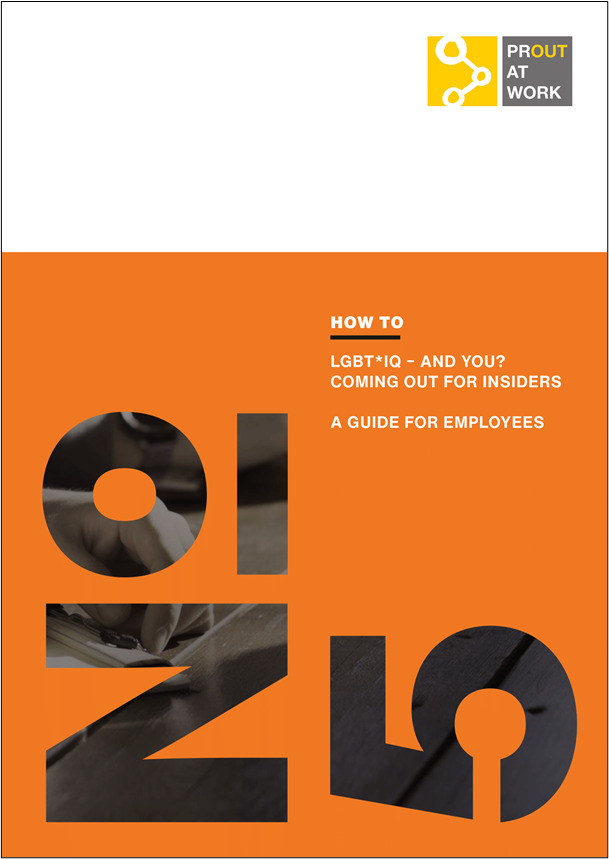
HOW TO No. 5 | GERMAN & ENGLISH
LGBT*IQ FOR EMPLOYEES. LGBT*IQ – AND YOU? COMING OUT FOR INSIDERS.
With this guide, we primarily address members of the LGBT*IQ community who wish to appear with their whole self in their everyday work. The guide provides answers to important questions and practical tips for coming out at the workplace.
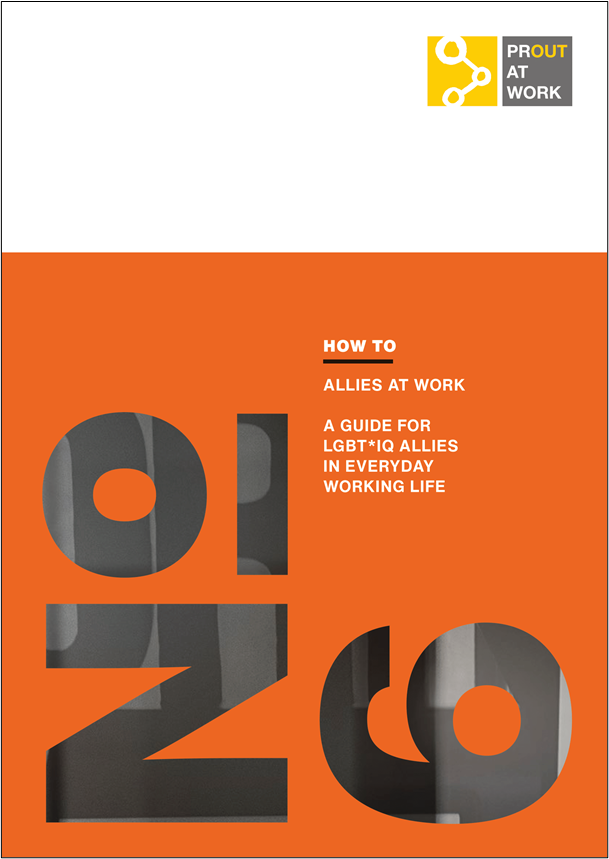
HOW TO No. 6 | GERMAN & ENGLISH
ALLYSHIP. ALLIES AT WORK. A GUIDE FOR LGBT*IQ ALLIES IN EVERDAY WORKING LIFE
Anyone can be a LGBT*IQ ally anytime and anywhere – that is the ideal case! This guide is primarily aimed at the situation of employees. We show, where they can find other LGBT*IQ allies in their company and give them concrete recommendations for successful cooperation.
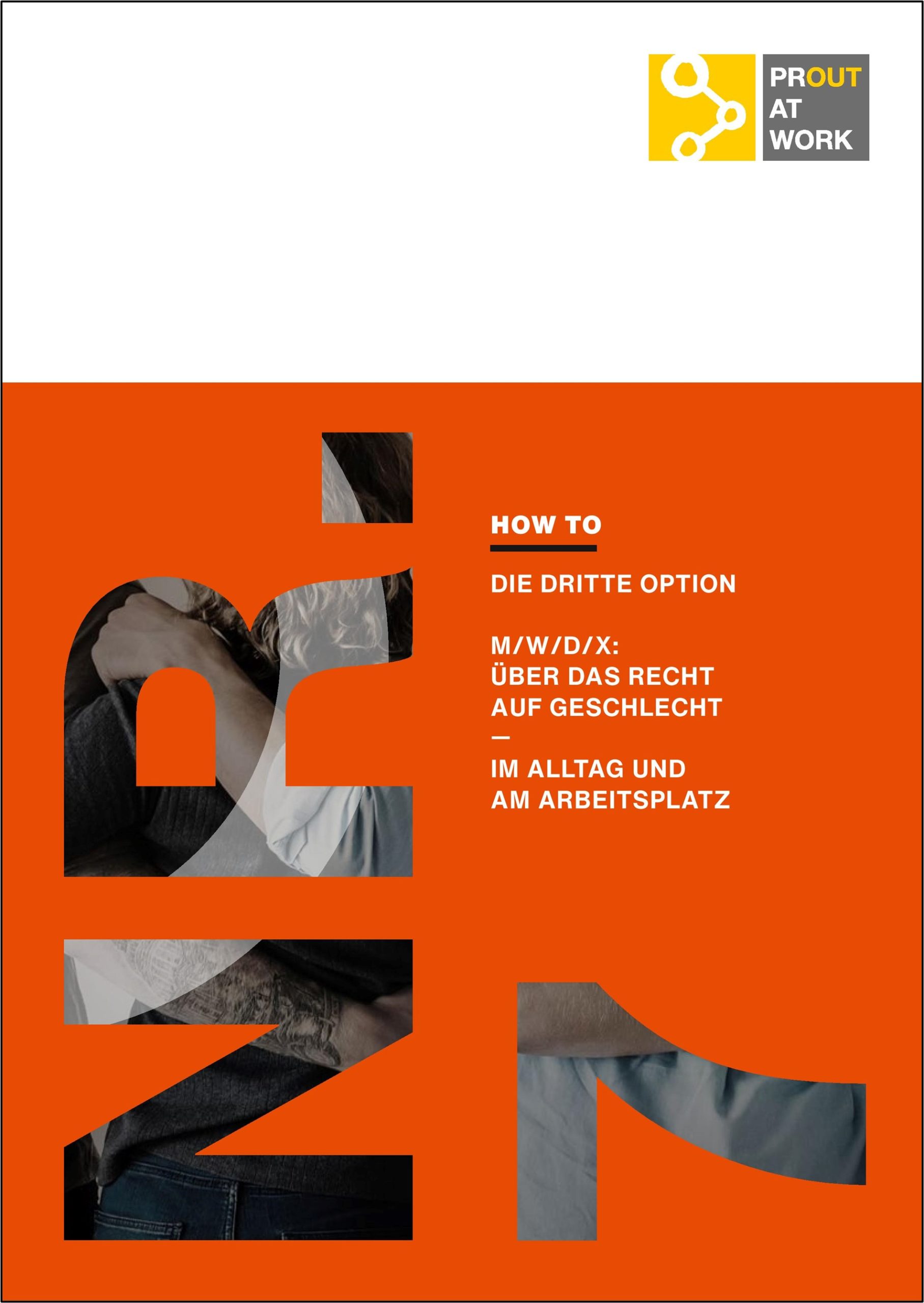
HOW TO No. 7 | german
THE THIRD OPTION AND ITS IMPLEMENTATION IN COMPANIES.
What does gender mean? What is the introduction of a third gender option all about? And what does it mean for employees and employers? In this guide, we have collected answers – as well as measures to implement the law in companies and create an open work culture.
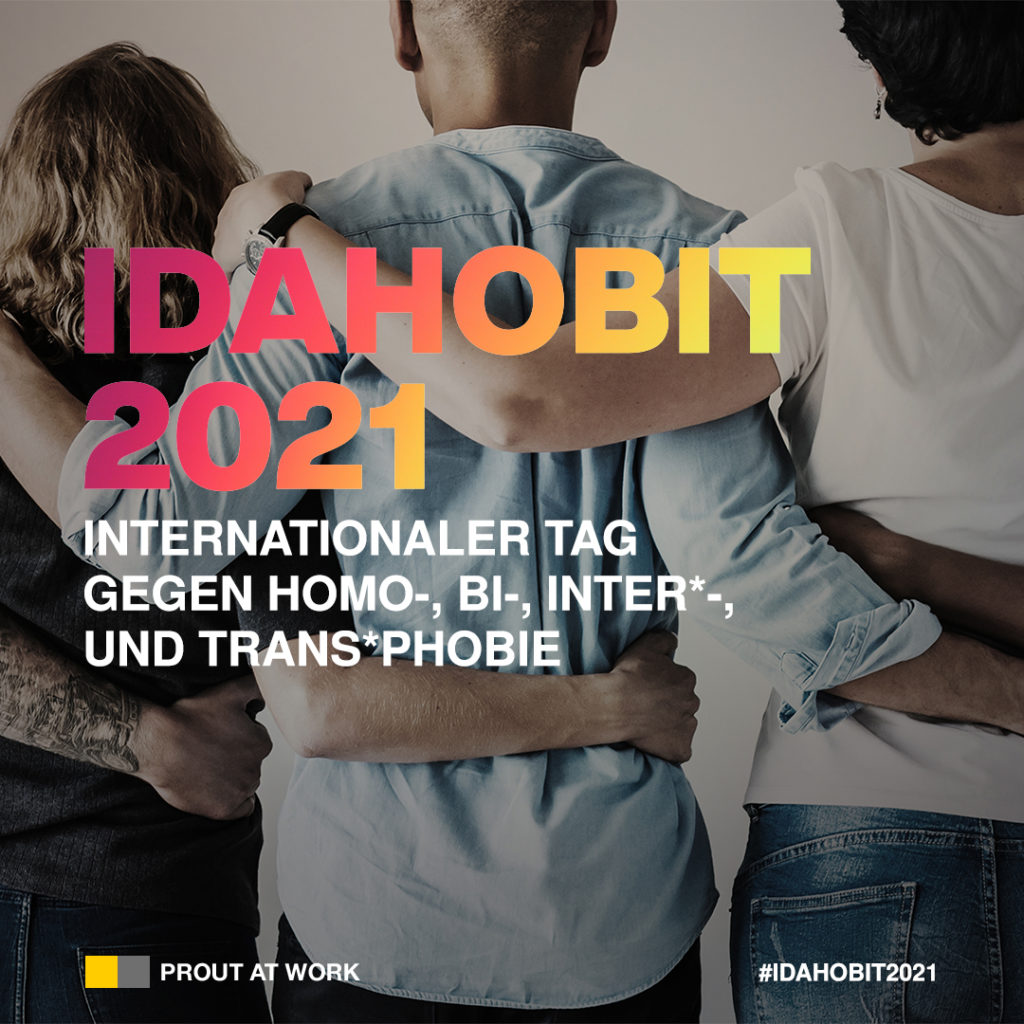
Campaign #QueerAtWork for IDAHOBIT
The International Day against Homophobia, Bi-, Inter- and Transphobia (IDAHOBIT) has been celebrated annually on May 17 since 2005 to highlight discrimination against the LGBT*IQ community, to raise awareness of existing inequality structures and to take a united stand for diversity and tolerance. May 17 marks the day in 1990 when the WHO removed homosexuality from the diagnostic code for diseases. For this year’s IDAHOBIT, we are calling on all LGBTIQ employees, regardless of their company, to post a portrait photo on their social media channels with the hashtag #QueerAtWork.
How can i participate in the Campaign?
- Inform and approach LGBT*IQ people from your own network and beyond to make them aware of the campaign
- Create a portrait photo using the templates, whether printed out or digitally using a tablet. (Be sure to clarify in advance whether you may use the employer’s company logo along with the template. Instead, you can use the company name or use the template without company information.)
- Post your own campaign photo along with the statement on May 17 2021, 9:00 am (CEST) with the respective hashtags and taggings on whatever social media channels you use
All the information, including the statement and template for the action, can be found summarized here as a download.
Hashtags
#IDAHOBIT2021
#QueerAtWork
#ProutAtWork
#FlaggeFürVielfalt
#LGBT
#[Diversity-Hashtag of your company]
#[Diversity-Hashtag of your corporate network]
Taggings
PROUT AT WORK
Facebook: @PrOut@Work
Instagram: @proutatwork
LinkedIn: @PROUT AT WORK-Foundation
Twitter: @proutatwork
If applicable, own company
Position yourself and your company as a supporter of the campaign and call on employees and executives to participate. Use the campaign to effectively advocate against LGBT*IQ discrimination internally and externally. The campaign is based on an idea by Magenta Pride, Deutsche Telekom’s LGBT*IQ employee network, and is supported by it.
IDAHOBIT 2021
Facts
Studies show that workplace discrimination experiences are still part of everyday life for many LGBT*IQ people. The study “Inter in the Office?!” The work situation of inter* people in Germany under a differential perspective to (endo) LGBTQ+ people.”, published in 2020 by Prof. Dr. Dominic Frohn states that 37.7% of (endo) trans and/or non-binary people surveyed, approx. 30% of inter* respondents and approx. 20& of (endo* cis) LGB+ people directly experience workplace discrimination , in the form of e.g. job rejection, transfer or dismissal.
It’s not surprising, then, that according to a Boston Consulting Group survey (2018/19), 22% of respondents see coming out at work as a potential career risk. 42% would lie to their manager about their sexual orientation and/or gender identity. More background information and studies on LGBT*IQ (in the workplace).
Support
Discrimination against LGBTIQ people is evident at other levels of society besides the workplace. Deal with these issues and make yourself aware of existing inequality structures. Only by becoming aware of these structures and grievances can you actively contribute to their dismantling. The points mentioned here are only an excerpt and not a complete list of possibilities with which you can start your commitment for LGBTIQ equal opportunities and against homophobia, bi-, inter- and transphobia.
Blood Donation
Discrimination against LGBT*IQ people is evident at other levels of society besides the workplace. Deal with these issues and make yourself aware of existing inequality structures. Only by becoming aware of these structures one can actively contribute to their dismantling. The points mentioned here are only an excerpt and not a complete list of possibilities with which you can start your commitment for LGBT*IQ equal opportunities and against homophobia, bi-, inter*- and trans*phobia.
EU LGBT*IQ Freedom Zone
In 2020, some Polish municipalities and cities declared their region as so-called “LGBT-free zones”. The establishment of entire regions where, according to the signatories, no LGBT*IQ people live is a clear attack on lesbian, gay, bisexual, trans and inter* people. As a first step, the European Parliament has declared the EU as an “LGBTIQ Freedom Zone” to send a clear message against the homophobic rhetoric and sentiment against sexual minorities in Poland. Find out more about the current events in this regard.
Selbstbestimmungsgesetz
The currently valid “Transsexuellengesetz” (TSG) is deeply discriminatory and should be replaced by the self-determination law. “The parliamentary group Bündnis 90/Die Grünen has submitted a bill “for the repeal of the transsexual law and introduction of the self-determination law” (19/19755)”. On May 19, there is a discussion on this in the Bundestag, in which it will also come to the vote. You can currently still contact suitable deputies in this regard.
A basic Law for all
Demand the addition of Article 3 GG, because LGBT*IQ people are still not protected by Article 3 in the German Basic Law. Many people within the LGBT*IQ community experience discrimination, exclusion and hate violence. We feel that a protection by the Basic Law is indispensable and therefore PROUT AT WORK is one of the first signatories of the appeal “A Basic Law for All”. Sign also now the petition or contact your delegates.
Legal Equality for queer Families
Stand up for the rights of rainbow families. Compared to children of heterosexual couples, the second mother must first adopt her child to provide legal protection – even if the parents are married. For example, support the nodoption campaign, which opposes stepchild adoption among rainbow families and advocates for recognition of parenthood.
People from the LGBT*IQ Community
As part of Awareness Day, we asked people from the LGBT*IQ community which role models helped them come out and why. We also asked them what structural changes they would like to see for more LGBT*IQ equality.
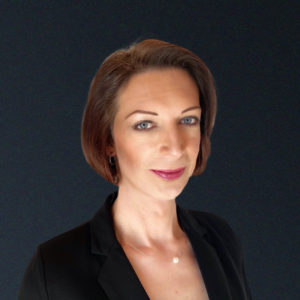
Sandra Vollmer, Vorstand Finanzen und HR, 1&1 Mail & Media Applications SE
Welche Role Models haben Dir beim Coming Out geholfen und wieso?
“Ich habe mich intensiv mit dem Outing v.a. anderer trans* Frauen beschäftigt. Sowohl im persönlichen Austausch mit anderen trans* Frauen, aber auch durch Recherche und das Studium vieler Biografien. Besonders bewegt haben mich die Lebenswege von Valerie Schnitzer (“Geheilte Seele – Befreites Ich”), die ich im Rahmen einer Lesung persönlich kennenlernen durfte, und natürlich die Geschichte von Anastasia Biefang, die als Führungskraft in der landläufig als „konservativ“ geltenden Bundeswehr ihre berufliche Transition erfolgreich vollzogen hatte. Wenn man es so will, war Anastasia für mich der Moment, wo ich mir sagte ‚Okay, Sie hat das klasse gemacht. Wenn das als Führungskraft in der Bundeswehr möglich ist, muss eine Transition in meinem Unternehmen für mich als Vorständin ebenfalls nicht unmöglich sein?‘ Und auch wenn ich am Ende die Kraft und den Mut für mein Outing aus ganz vielen unterschiedlichen Quellen geschöpft habe, war ihre Geschichte sicherlich eine davon!”
Welche strukturellen Änderungen in der Arbeitswelt wünschst Du Dir für mehr LGBT*IQ-Chancengleichheit?
“Ich würde mir wünschen, dass noch mehr Entscheider_innen althergebrachte Rollenbilder und Vorurteile abbauen, und mit geistiger Offenheit Vielfalt als Chance verstehen. Chance deshalb, weil ich fest davon überzeugt bin, wenn alle Mitarbeiter_innen ihre Talente einbringen und entfalten können, entstehen vielfältige und neue Ideen. Außerdem trägt das zu einem komplexeren und umfangreicheren Verständnis der Kund_innen bei, zu denen auch die LGBT*IQ Community zählt. Und zu guter Letzt erhöht das die Attraktivität als Arbeitgeber_in. Um das zu erreichen Bedarf es klarer Zielvorgaben durch die Unternehmensführung / Aufsichtsgremien, und ein professionelles Diversity Management, das einen bunten Blumenstrauß an Maßnahmen treibt und Fortschritte in der operationalen Umsetzung misst. Tendenziell also eher ein Marathon als ein Sprint! Und gerade deshalb sind Initiativen wie der IDAHOBIT so wichtig. Sie geben Denkanstöße, zeigen Handlungsalternativen auf und schaffen im besten Fall den Nährboden für ein Veränderungsbewusstsein.”
Sonsoles Pérez Laporta, Unternehmenskommunikation, AUDI Planung GmbH
Welche Role Models haben Dir beim Coming Out geholfen und wieso?
“Inspirierende Role Models haben zwei Merkmale: Wir können uns mit ihnen identifizieren und sie zeigen uns, was wir werden können: stark, mutig und sichtbar.”
Welche strukturellen Änderungen in der Arbeitswelt wünschst Du Dir für mehr LGBT*IQ Chancengleichheit?
“Coaching und Mentoring-Programme für die LGBT*IQ-Community und Aufklärung für potentielle Allies. In der Diversität sind wir stark, wenn uns die Vielfalt und ihre Vorteile bewusst sind und gefördert werden.”

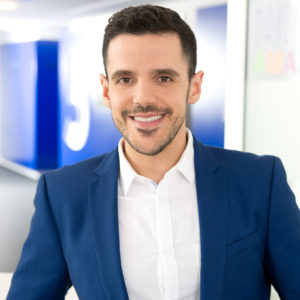
Thiago Machado, Global Senior Brand Manager, Beiersdorf
Which role models helped you coming out and why?
“Having peers and leaders openly out gave me the confidence to be myself and authentic at work – it gave me the confidence to be myself and keep working continuously to build a successful career. Having a role model made me realize I can be myself, that I can share about my personal life and take initiatives for a more inclusive environment. It does make a difference and I strongly believe that having people to look up to encourages me every day to do my best and be the example for the others around me.”
Which structural changes in the work environment aiming for equality of opportunities for the LGBT*IQ community do you wish for?
“First and foremost it is key that we integrate clear anti-discrimination guidelines into our HR policies and that we enforce these when we are made aware of behaviour that is not in line with these guidelines. Furthermore, every employer should offer similar benefits to same sex couples as they would to non-same-sex couples, that seems only fair to me! I also really believe in training to educate ALL our employees on Diversity & Inclusion, this plays a very important role for an inclusive and respectful environment. It gives the employees the opportunity to put themselves in the others’ shoes, respecting and valuing the diversity & inclusion. I wish for an environment where the workforce, globally, has the tools and information to understand that an inclusive workplace means more motivation, more productivity and more authenticity.
I wish that it is reflected not only in all internal touchpoints – recruitment & development, but also externally, positively impacting the society.”
Maik Brunkow, Employer Branding, KGMG Deutschland
Welche Role Models haben Dir beim Coming Out geholfen und wieso?
“Mein erstes großes Coming Out hatte ich leider nicht selbst bestimmt, aber ich habe meine sexuelle Orientierung auch mit 13 schon nicht verleugnet. Das lag zum Teil auch an vielen verschiedenen Stars im Musikbusiness, die schon erfolgreich Out waren. Ganz explizit waren das der Keyboarder einer deutschen Rockpopband und der Gewinner des britischen Castingformats Pop Idol.
Als nicht binäre Person hatte ich nie ein richtiges Coming Out. Einzelne Freund*innen waren Teil des Prozesses, in dem mir klar geworden ist, dass die, die mir in meinem Leben in unterschiedlichen Situationen gesagt haben, ich wäre entweder zu männlich oder zu weiblich, einfach unrecht hatten. In dieser Zeit hat es sehr geholfen, dass ein genereller gesellschaftlicher Wandel stattfindet. Die vielen Menschen, die sich nicht mehr einem binären Geschlechtssystem einordnen wollen und das öffentlich zeigen, sind für mich unglaublich wichtig. Irgendwann habe ich dann einfach angefangen, in meine Profile reinzuschreiben, dass ich Pronomen ablehne, wenn sie nicht benötigt werden. Sehr hilfreich war es für mich aber auch, dass meine Führungskraft aus einem Praktikum, das ich mal gemacht habe, jetzt auch in ihren Online-Profilen stehen hatte, dass sie nun they/them Pronouns verwendet.”
Welche strukturellen Änderungen in der Arbeitswelt wünschst Du Dir für mehr LGBT*IQ Chancengleichheit?
“Manchmal könnte man denken, wir wären schon am Ende der Gleichberechtigung angekommen. Ich glaube nicht, dass wir schon soweit sind. Auf gesellschaftlicher Ebene müssen wir unbedingt die rechtlichen Hürden für Geschlechtsangleichungen heruntersetzen und dringend die Stiefkindadoption für gleichgeschlechtliche Paare erleichtern. Am Arbeitsplatz folgen daraus für mich ganz konkrete Änderungen: es gibt in vielen Unternehmen immer noch keine Möglichkeit, Angaben zum Geschlecht mal eben zu ändern. Außerdem unterscheiden Policies zur Elternzeit und zur Rückkehr aus der Elternzeit noch häufig zwischen Männern und Frauen. Gleichgeschlechtliche Paare werden hier nur selten direkt angesprochen. Neben einem langfristigen Wandel von Unternehmenskulturen, sehe ich hier die größten Baustellen.”
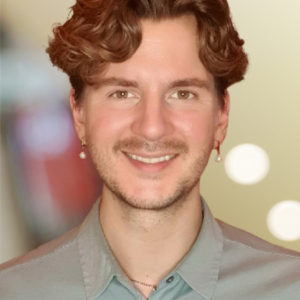

Merve Aksoy, Schauspielerin
Welche Role Models haben Dir beim Coming Out geholfen und wieso?
“Maren Kroymann, ihre selbstbewusste offene Art hat mir gezeigt wie selbstverständlich das ist und trotzdem eine erfolgreiche Schauspielerin sein kann. Ruby Rose, sie steht zu sich und ihrem Lifestyle, ihrem Style. Sie zeigt die „nackte“ Wahrheit. Sie engagiert sich für homosexuelle Rechte. Ich finde sie sehr mutig. Ich möchte auch andere inspirieren und unterstützen durch meine Sichtbarkeit beim Coming Out zu helfen.”
Welche strukturellen Änderungen in der Arbeitswelt wünschst Du Dir für mehr LGBT*IQ Chancengleichheit?
” Ich wünsche mir besseren Schutz vor Diskriminierung. Firmen sollen Diversity-Trainings und geschlechtsneutrale Toiletten anbieten. In Jobbeschreibungen die neutrale/korrekt gegenderte Version wählen (also “Fachperson” statt Fachmann, oder Reinigungsfachkraft statt Putzfrau). Die Möglichkeit gerade für trans Personen, schon vor der öffentlichen Namensänderung den gewählte Namen im Betrieb/Mailadresse usw. zu verwenden. Eine interne Ansprechstelle, wo Diskriminierung (von Kund*innen oder Mitarbeitenden) gemeldet werden kann.”
Counseling
LesMigras
“LesMigraS is the anti-discrimination and anti-violence section of lesbian counseling Berlin e.V.”
Gladt e.v.
” GLADT is a self-organization of black and of color lesbians, gays, bisexuals, trans, inter and queer people in Berlin, which stands up against racism, sexism, trans* and homophobia, ableism and other forms of discrimination and offers a diverse range of counseling services.”
Antidiskriminierungsstelle des Bundes
“The counseling team with lawyers can inform you about your rights in a case of discrimination or sexual harassment, show you possibilities if and how you can enforce your rights, strive for an amicable conflict resolution and try to name experts close to your home.”
Bundesverband trans*
“The Bundesverband Trans* (BVT) sees itself as an association of individuals, groups, clubs, associations and initiatives at regional, state and national level, whose common endeavor is the commitment to gender diversity and self-determination and the commitment to human rights in terms of respect, recognition, equality, social participation and health of trans or persons not located in the binary gender system.”
Deutsche Gesellschaft für Transidentität und Intersexualität e.V.
“Die dgti hat sich zum Ziel gesetzt, die Akzeptanz von Transidenten innerhalb der Gesellschaft zu fördern und deren Stigmatisierung entgegenzuwirken. Sie soll Betroffene und Interessierte beraten und betreuen, sofern dies gewünscht wird. Ein wesentlicher Aspekt der Arbeit sollte die (Re-)Integration von Betroffenen in den Arbeitsprozess sein, um so der Gefahr des sozialen Abstiegs zu begegnen, der heutzutage noch mit dem sozialen Wechsel verbunden ist. Sie tritt für mehr Offenheit der eigenen Identität gegenüber ein und trägt der Vielfalt menschlichen Daseins Rechnung.”
We look forward to a successful campaign!
If you have any further questions, please do not hesitate to contact us.

Campaign: #theLworksout for Lesbian Visibility Day
In contrast to many gay people, lesbian persons and also bisexual women are often not perceived, one speaks of Lesbian Invisibility. To this day, there are few visible lesbian role models – especially in the business context. In many networks lesbian persons are in the minority. As a result, there is a lack of role models for new and younger colleagues. Through the cross-network and cross-sector campaign #theLworksout on April 26, we can empower openly lesbian people and together create visibility through a large number of participants, as well as highlight the diversity of lesbian people.
HOW CAN I PARTICIPATE IN THE campaign?
- Inform lesbian people from your own network and beyond to make them aware of the action.
- Create a portrait photo using the templates, whether printed or digitally with the tablet. You are also welcome to use the template in grayscale, for example. (Make sure to clarify in advance whether you are allowed to use the employer’s company logo together with the template. Instead, you can use the company name or use the template without the company name).
- Post your own campaign photo on 26.04.2021 from 10:00 am with the respective hashtags and taggings on the social media channels you use
Hashtags
#theLworksout
#LesbianVisibilityDay
#LesbianVisibility
#LesbischeSichtbarkeit
#LGBTIQBusinessLadies
#ProutAtWork
#LGBTIQRoleModels
#FlaggeFürVielfalt
Taggings
PROUT AT WORK
Facebook: @PrOut@Work
Instagram: @proutatwork
LinkedIn: @PROUT AT WORK-Foundation
Twitter: @proutatwork
If applicable, own company
Position yourself and your company as a supporter of the campaign and for lesbian visibility and call on employees to participate.
The campaign was initiated jointly by the PROUT AT WORK-Foundation and LGBT*IQ business networks. The Lesbian and Gay Association (LSVD) and Wirtschaftsweiber e.V. support the campaign.
We look forward to a successful campaign!
If you have any further questions, please do not hesitate to contact us.
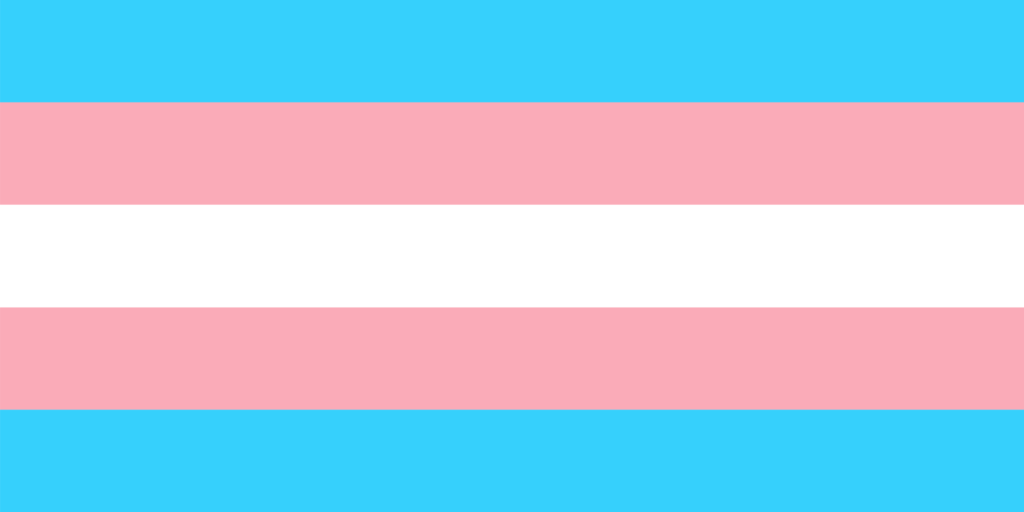
The International Transgender Day of Visibility takes place on March 31. This day should be used to empower the trans* community, create awareness for trans* topics and draw attention to existing discriminatory structures. We would like to contribute again this year to achieve more visibility for t* in LGBT*IQ.
To kick off the event, we held a panel on March 29th with the topic “trans* at work – existing difficulties & discrimination-free transitions”. Together with our panelists Julia Monro and Andrea Schuler, we mainly talked about stressful situations that trans* people can find themselves in during their transition. We illuminated these negative moments, let trans* people speak with their individual experiences in order to make existing discriminatory structures visible. It is important for us to present this side as well, in order to see and work out where there is room for improvement for companies and the responsible parties – and thus for the trans* people concerned. This way, mistakes can be avoided in the future, allowing more trans* people to look back on their transition in their company with positive feelings.
Panelists:
Julia Monro
Julia supports the German Society for Transidentity and Intersexuality e.v. in public relations and offers counseling for transgender people. In 2018, she founded her own project called Transkids and offers workshops at schools as a lecturer of the Pädagogisches Landesinstitut. She is involved in the trans* community to improve the living situation of transgender people and reports, among other things, from her own biography of experiences of discrimination in society and the world of work.
Andrea Schuler
Andrea Schuler’s area of expertise is the impact of gender diversity in social and professional contexts. After completing her Bachelor of Arts in Management of Social Innovations, Andrea was involved in the ERASMUS+ project Transvisible on the labor market integration of trans* people for the German Trans* Association. There, she collaborated on the publication TransVisible – A Guide for Better Labor Integration and Economic Empowerment of Trans* Women, among others. Andrea works as a psychosocial counselor at the Trans*Inter*Beratungsstelle München.
In the panel, the two experts asked the following question, among others.
“HOW CAN EMPLOYERS POSITION THEMSELVES TO MAKE TRANSITIONS GO WELL?”

Julia Monro, FREELANCE JOURNALIST AND TRANS* ACTIVIST
“Enormously important is the orientation to the person themselves, i.e. they set the pace and the direction. This additionally conveys appreciation and respects self-determined decisions, which increases satisfaction and loyalty.”
Andrea Schuler, CONSULTANT AND TRAINER, TRANSINTERCOUNSELING CENTER
“Many trans* people leave the company before they transition. So it’s incredibly important that a company sets the framework in advance for a good, shared, safe transition.”

n addition, in order to show examples of how a good and joint transition can work in the company, besides the existing difficulties, we asked trans* people the following question.
“WHAT HELPED YOU THE MOST IN A PROFESSIONAL CONTEXT DURING TRANSITION?”
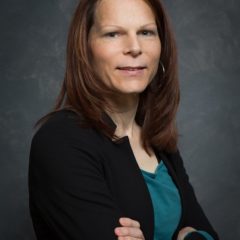
Alice Oehninger, BIOLOGY LABORATORY TECHNICIAN TRAINER, BOEHRINGER INGELHEIM
“The uncomplicated change of form of address and e-mail, etc., even before my official name change helped me immensely. My colleagues have always addressed me correctly from the beginning. Their trust and flexibility have strengthened me enormously.”
Adrian Hausner, Site Reliability Engineer, Google Germany GmbH
“I was especially helped by the ‘Trans at Google’ network. Having a community like that behind you is immensely empowering, and the fact that discrimination against trans* people is absolutely not accepted, plus the ability to use gender-neutral restrooms. That’s also very important for non-binary colleagues.”


Leonora Friese, Business Consultant, AXA Konzern AG
“During my coming out and transition, I benefited especially from the support I received from HR. For example, by informing the workforce with an interview in the employee newspaper, a panel discussion on DiversityDay and a video about me and my work in the Group. Together we also developed a guideline on coming out and transition, so that we can continue to support other people in the future.”
THE PERSON QUOTED WISHES TO REMAIN ANONYMOUS
“As a non-out, non-intersex non-binary trans* person, I would experience a great relief if my employer recognized and supported my gender identity – even if the registry offices do not. For me, this includes in particular firmly established offers to use my self-chosen first name wherever it is legally possible – e.g. in daily interactions, in e-mail addresses, on door signs, etc.”

Joschua Thuir, HEAD OF TEACHING GROUP | SPECIALIST TEACHER FOR LAW AND ADMINISTRATION, FEDERAL POLICE FORCE
“I was very happy to be able to fall back on an official contact person who is also trans* before my outing at the workplace. Since she had already gained outing experience in the authority and shared it with me, I was well prepared for negative reactions, indiscreet questions and other unpleasant situations.”
Franka Uhlig, BUSINESS INFORMATICS SPECIALIST, IBM GERMANY GMBH
“After coming out, I immediately received positive signals from my management and HR. Particularly helpful was the support in changing my name in the online systems, on my employee ID card and on my mail address, so that I could quickly ensure my appearance as a woman in the company and to customers.”
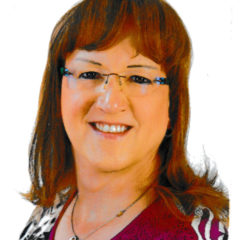
What can help me as a trans* person in a professional context? What counseling centers are there that I can turn to? Besides answers to these questions, we also offer an excerpt of possibilities that companies have to accompany a transition well. In addition, there are further tips for trans* persons and on the question of how you can be an Ally by supporting colleagues in transition.
FURTHER TIPS FOR TRANS* PEOPLE
The people quoting already offer some insight into support options. Here at a glance is an excerpt on further assistance:
- Seek allies and role models within the company.
- If possible, work with the company to create a communication and action plan.
- Very important: You set the pace!
- Connect with the LGBTIQ network, if one exists. We have compiled a list of LGBTIQ networks in companies and organizations.
TIPS FOR COMPANIES AND ALLIES
- A Transition Guide clearly specifies who is responsible. Note: the trans* person determines the pace and whether an action should be implemented. Every transition is individual.
- Enable name and pronoun changes before the official decision is made.
- Training sensitize HR and management
- Establish and strengthen an internal LGBTIQ network with dedicated trans contact persons
- Inform yourself about the topic trans*
- Use gender inclusive language, ask for a person’s pronouns so they use the one chosen by the trans* person and not their deadname. Deadname is the old, discarded name of a trans* person.
- Only ask questions that you would answer yourself
- Consciously stand up for the rights and against the discrimination of trans* persons
ADVISORY SERVICES (GErmany)
FEDERAL TRANS* ASSOCIATION
“The Bundesverband Trans* (BVT) sees itself as a union of individuals, groups, associations, federations and initiatives at regional, state and national level whose common endeavor is the commitment to gender diversity and self-determination and the commitment to human rights in terms of respect, recognition, equality, social participation and health of trans people or those not located in the binary gender system.”
GERMAN SOCIETY FOR TRANSIDENTITY AND INTERSEXUALITY E.V.
“The dgti has set itself the goal of promoting the acceptance of transidents within society and counteracting their stigmatization. It should advise and support affected and interested persons, if so desired. An essential aspect of the work should be the (re-)integration of affected people into the work process, in order to counteract the danger of social decline, which is still associated with social change today. It advocates more openness to one’s own identity and takes into account the diversity of human existence.”
Transmann e.V.
“Nationwide, volunteer-based, non-profit association for all woman-to-male (FzM/FtM) trans* and inter* people.”
TransInterQueer e.V.
“TrIQ is a social center and a politically, culturally and in the research field active association, which stands up for trans, intersex and queer living people in Berlin and beyond.”
TRANS*INTER*COUNSELING CENTER
“The project of the Münchner Aids-Hilfe e.V. is equally there for trans* and inter* people as well as their relatives and friends.”
TGEU
“TGEU is a membership-based organization that was founded in 2005. Since then, TGEU has grown steadily and established itself as a legitimate voice for the trans* community in Europe and Central Asia, with 157 member organizations in 47 different countries.”
Questions?
Contact us with questions and concerns about trans* in the workplace! We are happy to help.
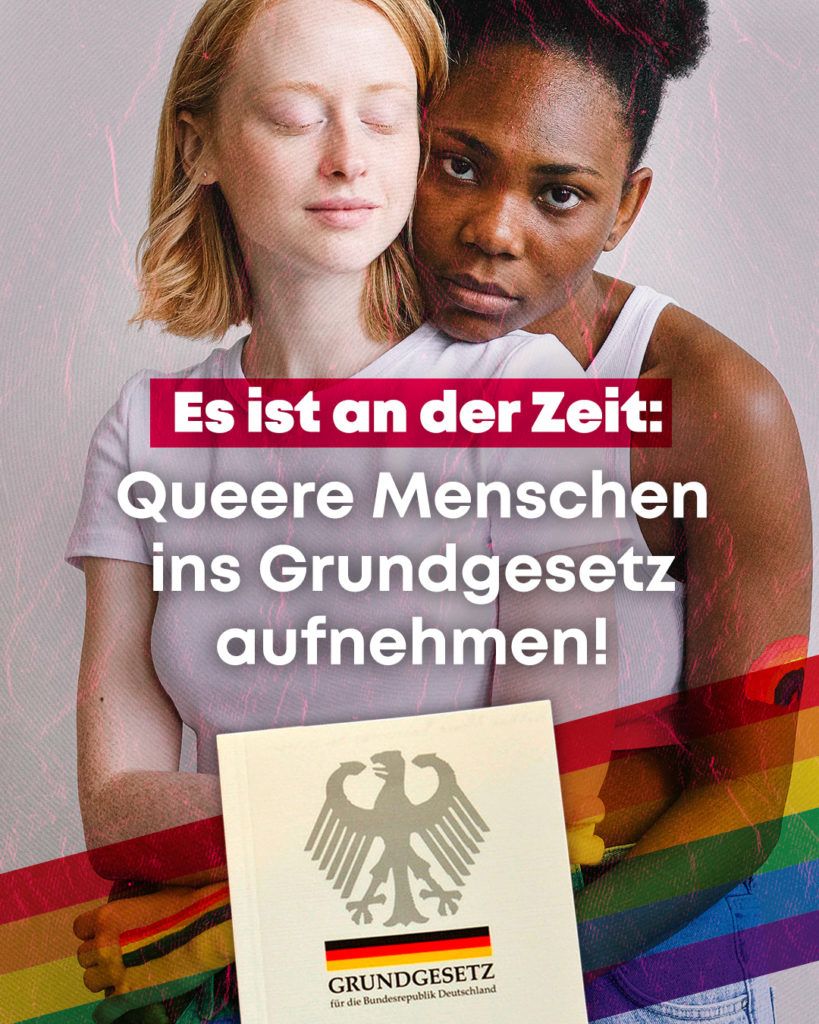
LGBT*IQ people are still not protected by Article 3 in the German Constitution. Many people from the LGBT*IQ community experience discrimination, exclusion and hate violence. We feel that a protection by the Constitution is indispensable and thus PROUT AT WORK is one of the first signatories of the appeal “A Basic Law for All”.
Federal government and Bundestag are currently negotiating the deletion of the term “race” in Article 3 of the Constitution. Let’s join together to send a strong message to politicians that sexual orientation and gender identity must be added to the article as well.

The Frankfurt University of Applied Sciences recently published a study on the situation of lesbian women in the workplace under the direction of Professor Dr. Regine Graml and with the collaboration of Prof. Dr. Tobias Hagen and Prof. Dr. Yvonne Ziegler. It discusses the intersection of homophobia and sexism and sheds light on the situation of working lesbian women in Germany in the application process and in working life.
The results of the study as well as recommendations for action for companies to eliminate discrimination were compiled in the brochure published by the Frankfurt University of Applied Sciences, the Bundesstiftung Magnus Hirschfeld, Wirtschaftsweiber e.V. and the PROUT AT WORK-Foundation.
You can now download thee study as a PDF and also order a printed copy. Both versions are only available in German.
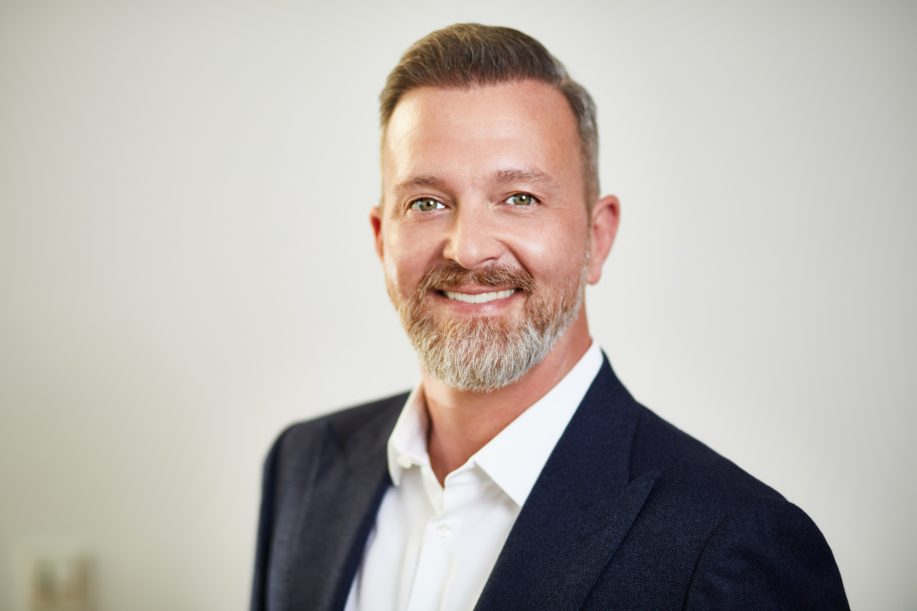
A talk with… Matthias Weber
“For me, visibility is one of the most effective instruments for creating acceptance.”
What does the visibility of LGBT*IQ have to do with leadership?
Matthias Weber: Modern management methods are based on the goal of fair treatment, appreciation and development of all employees. The fact that we are still a long way from achieving such an inclusive and diversity-oriented working and management environment is shown not only by actually measurable quotas of women, but also by the results of representative studies: LGBT*IQs too often feel discriminated against and therefore largely prefer not to come out at the workplace. And here we are on the subject of visibility: for me, visibility is one of the most effective instruments for creating acceptance. Here leadership has a relevant meaning: starting at the top of the company, as “tone from the top” and then through all management levels, the company’s claim that all employees are equally valuable, measured according to their performance and promoted according to their potential must be made clear.
You advocate a holistic Diversity Management instead of a deficit-oriented approach at antidiscrimination – what are the most important differences between these approaches?
Matthias Weber: Deficit-oriented anti-discrimination approaches are mostly aimed at individual measures. Nevertheless, the legislator aims to prohibit discrimination here. This is a statement and important as a political signal, just as it is necessary as a legal basis for those affected. But from my point of view, it is important to work to ensure that discrimination does not arise – and that is because people’s attitudes towards each other are respectful and mutually accepting. This is where holistic diversity management can offer effective strategies in both public and private companies.
In Germany, a large part of LGBT*IQ-community still decides not to come out at the workplace. What is the difference to other countries – what is done better there? What can we learn from that?
Matthias Weber: According to my opinion, this is essentially a question of culture, society and personal self-conception. In France, around 60 per cent have their coming out at the workplace, despite the fact that the fear of being disadvantaged in working life is greater. The deeply rooted urge for freedom and self-determination, no matter what the cost, is more pronounced in our neighbours than in Germany, and there are countless examples of this on both sides. Our state structure as a non-secular state also plays a not inconsiderable role in this context. All we can do is intensify our work, and the everlasting key is visibility at all levels – no matter what the cost.

A talk with… Matthias Weber
“For me, visibility is one of the most effective instruments for creating acceptance.”
What does the visibility of LGBT*IQ have to do with leadership?
Matthias Weber: Modern management methods are based on the goal of fair treatment, appreciation and development of all employees. The fact that we are still a long way from achieving such an inclusive and diversity-oriented working and management environment is shown not only by actually measurable quotas of women, but also by the results of representative studies: LGBT*IQs too often feel discriminated against and therefore largely prefer not to come out at the workplace. And here we are on the subject of visibility: for me, visibility is one of the most effective instruments for creating acceptance. Here leadership has a relevant meaning: starting at the top of the company, as “tone from the top” and then through all management levels, the company’s claim that all employees are equally valuable, measured according to their performance and promoted according to their potential must be made clear.
You advocate a holistic Diversity Management instead of a deficit-oriented approach at antidiscrimination – what are the most important differences between these approaches?
Matthias Weber: Deficit-oriented anti-discrimination approaches are mostly aimed at individual measures. Nevertheless, the legislator aims to prohibit discrimination here. This is a statement and important as a political signal, just as it is necessary as a legal basis for those affected. But from my point of view, it is important to work to ensure that discrimination does not arise – and that is because people’s attitudes towards each other are respectful and mutually accepting. This is where holistic diversity management can offer effective strategies in both public and private companies.
In Germany, a large part of LGBT*IQ-community still decides not to come out at the workplace. What is the difference to other countries – what is done better there? What can we learn from that?
Matthias Weber: According to my opinion, this is essentially a question of culture, society and personal self-conception. In France, around 60 per cent have their coming out at the workplace, despite the fact that the fear of being disadvantaged in working life is greater. The deeply rooted urge for freedom and self-determination, no matter what the cost, is more pronounced in our neighbours than in Germany, and there are countless examples of this on both sides. Our state structure as a non-secular state also plays a not inconsiderable role in this context. All we can do is intensify our work, and the everlasting key is visibility at all levels – no matter what the cost.
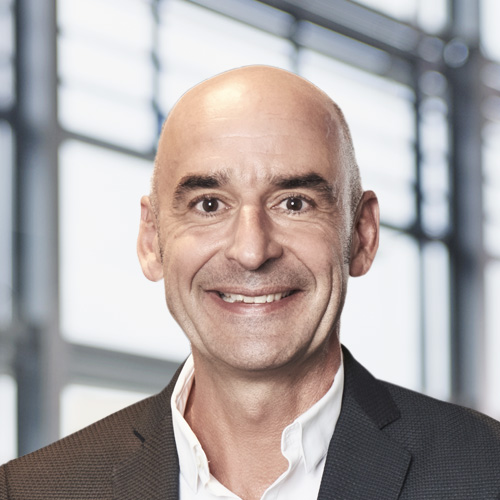
PROUT EMPLOYER Campana & Schott
“Openness and tolerance are here to stay.”
Dr. Christophe Campana is the founder and managing director of Campana & Schott. He has over 25 years of experience in (top) management consulting and is a member of various expert and advisory boards. His main areas of focus include “strategic project and portfolio management” as well as “new forms of collaboration” with a special focus on social collaboration. Dr. Christophe Campana is the author of over 50 publications on the subject of project and portfolio management.
In simple words, Campana & Schott is providing advice to their customers on strategies to keep their finger on the pulse. What role does diversity play here?
Dr. Christophe Campana: Events such as climate change, radicalization, populism, etc. have led to the point that more and more people are concerned with meanings and values. Most people have recognized that “healthy” progress and prosperity cannot be done without moral values and sustainability. Diversity is one of these values and therefore an essential part of this overarching development. Excluding people due to their sexual orientation promotes hatred and prevents a sustainable better future for everyone. There is still a lot to be done here.
Campana & Schott received three awards as a “Great Place to Work”. The list of your commitments towards the diversity of your employees is long and you are building on long-term cooperation instead of “hire and fire”. Has the PROUT EMPLOYER cooperation been the last piece of the puzzle for an open and inclusive work environment?
Dr. Christophe Campana: There will probably never be that one last piece of the puzzle. For us, the cooperation with PROUT EMPLOYER is an important part of our commitment, which we are constantly developing further. I keep learning new things, e.g. only recently the Federal President Steinmeier made a very clear point in the context of the anti-racism riots where he said: “It is not enough to not be a racist. We have to be anti-racists.” This view also applies to me with regard to diversity and our corporate culture. I am convinced that in the future there will always be topics that managers should deal with in the interests of their company: openness and tolerance are here to stay.
“I understood that as an entrepreneur you have to take a visible and public position on this in order to reach out to the community and signal: Live your sexuality as you want: openly or not – both are fine.”
What advice would you give to companies that are just starting their commitment to LGBT*IQ diversity?
Dr. Christophe Campana: At Campana & Schott there have always been employees who have lived out their homosexuality openly. Therefore, homophobia had no place in our company. For a long time, I believed that this was enough. Only later, I understood that as an entrepreneur you have to take a visible and public position on this in order to reach out to the community and signal: Live your sexuality as you want: openly or not – both are fine. But if you want to live it openly, you will not suffer any disadvantage in our company. It’s just a small step, but it does a lot – and only good.
From our experience we know that LGBT*IQ diversity has the greatest impact in a company when executives, diversity management and the company’s corporate networks regularly come together. Is that also your recipe for success?
Dr. Christophe Campana: Yes, I myself regularly meet with our LGBTQ+ network and have learned a lot from these meetings, e.g. the so-called “Monday lie”, when colleagues chat with each other during the coffee break about the last weekend and some prefer to describe their life partner as “a friend”.
I could immediately emphasize the stress associated with this white lie when my employees told me that they had felt like this for very long periods of time, sometimes even years. That is why the close exchange is so crucial: You start to better understand the problems of the community and can actually start changing things more targeted.
The last question: There are turbulent times coming for employees. Considering your commitment to diversity, how would you react to the statement that starting from now, there are more important topics than LGBT*IQ diversity?
Dr. Christophe Campana: There is a difference between the urgency and the importance. The unexpected severity with which the corona pandemic has affected all areas of life resulted in existential challenges for many companies which we will have to deal with. Just because you douse a fire in an apartment doesn’t mean that your general life in the apartment becomes unimportant. This crisis overshadows many issues, which, however, do not become irrelevant – on the contrary: I am convinced that companies with an open and appreciative culture will get through the crisis better. Diversity is an essential part of corporate identity and contributes to the performance and resilience of an organization.
